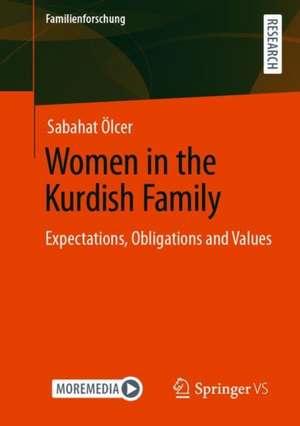Women in the Kurdish Family: Expectations, Obligations and Values: Familienforschung
Autor Sabahat Ölceren Limba Engleză Paperback – 30 iul 2020
Preț: 387.38 lei
Nou
Puncte Express: 581
Preț estimativ în valută:
74.13€ • 76.93$ • 61.96£
74.13€ • 76.93$ • 61.96£
Carte tipărită la comandă
Livrare economică 17-31 martie
Preluare comenzi: 021 569.72.76
Specificații
ISBN-13: 9783658308612
ISBN-10: 3658308613
Pagini: 284
Ilustrații: XV, 284 p.
Dimensiuni: 148 x 210 mm
Greutate: 0.4 kg
Ediția:1st ed. 2020
Editura: Springer Fachmedien Wiesbaden
Colecția Springer VS
Seria Familienforschung
Locul publicării:Wiesbaden, Germany
ISBN-10: 3658308613
Pagini: 284
Ilustrații: XV, 284 p.
Dimensiuni: 148 x 210 mm
Greutate: 0.4 kg
Ediția:1st ed. 2020
Editura: Springer Fachmedien Wiesbaden
Colecția Springer VS
Seria Familienforschung
Locul publicării:Wiesbaden, Germany
Cuprins
1. Introduction.- 2. Theoretical Framework of the Empirical Study.- 3. The Kurdish Family System.- 4. In-Laws Relationship.- 5. Methodology.- 6. In-Laws Relationships in the Homeland.- 7. In-Laws Relationships in Germany.- 8. Similarities and Differences: Comparison of Germany and Turkey.- 9. Conclusion
Notă biografică
Sabahat Ölcer is a post-doctoral researcher at the School of Medicine Health Services Research Unit at Witten/Herdecke University, Germany. Her research interest includes family relations, immigration, Kurds, gender studies, forced migration, emotions, and immigrant health.
Textul de pe ultima copertă
This book deals with female-female bonds in the Kurdish family system, in particular in relationships between in-laws, by comparing Kurdish families in Turkey and Germany. It explains the dynamics of in-laws’ relationships, taking into consideration normative gender stereotypes and the features of the rule of patrilineal descent which are characterised by Kurds and increase the possibility of domestic co-existence of Kurdish in-laws. In the context of the social features of the host countries in which Kurds live, this research reveals in what aspects the relationships between immigrant in-laws are different to those whose families are characterised by a bilateral kinship system, as is found in Western societies. It reveals how cultural meanings and values they brought with them from their country of origin affect their expectations and experiences with each other in their daily routines, considering the challenges that may arise from the collision of new and old patterns in cultural, economic, and social domains.











